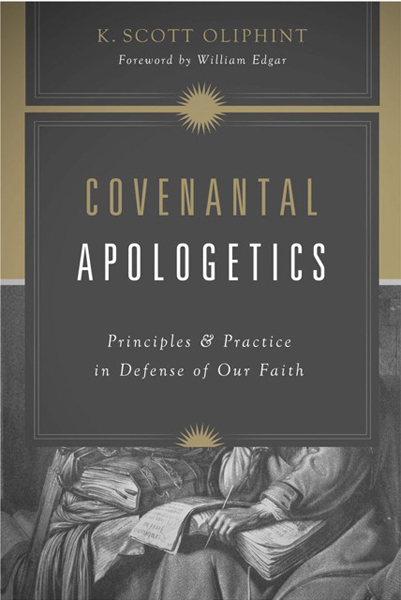
K. Scott Oliphint
Reviewed by: Roger Wagner
Covenantal Apologetics: Principles and Practice in Defense of Our Faith, by K. Scott Oliphint. Published by Crossway, 2013. Paperback, 277 pages, list price $19.99. Reviewed by OP pastor Roger Wagner.
"To see the face of God everywhere and to do all things … to the glory of God, that is the heart of the covenant idea.… There are two and only two classes of men. There are those who worship and serve the creature and there are those who worship and serve the Creator. There are covenant breakers and there are covenant keepers.… It is a part of the task of Christian apologetics to make men self-consciously either covenant keepers or covenant breakers." So wrote Cornelius Van Til in Christian Apologetics (pp. 26–27).
This emphasis on covenant in Van Til's apologetic method is behind K. Scott Oliphint's decision to "retire" the long-used designation "presuppositional apologetics" in favor of a more accurate one: "covenantal apologetics."
As he points out in his introduction (p. 25), his intention is to set forth a presuppositional approach to apologetics, largely free of technical vocabulary and organized around the concept of covenant. Like other disciples of Van Til (e.g., John Frame and Greg Bahnsen), Oliphint wants to "translate" the often philosophical terms and concepts used by Van Til into language that is both more accessible and more directly related to the language and categories of Scripture. His book is a very helpful effort in that direction.
The Christian apologist seeks to present arguments in support of the faith that are not only sound, but persuasive to the unbeliever (recognizing always that persuasion requires the illuminating work of the Holy Spirit). In chapter 4, Oliphint sets out a "theology of persuasion" following the outline of Aristotle's trivium of persuasion: ethos, pathos, and logos.
Ethos directs our attention to the character of the apologist. Arguments are presented by a person, and the character of that person influences how his arguments are received. "Our defense should reflect Christ's sovereignty and our willing service to him" (p. 144). Holy boldness with gentleness and respect are the watchwords here.
"When we speak of pathos, we are interested in a proper and personal understanding of those to whom we speak" (p. 146). The apologist must understand his audience. He must be a good listener—attentive and thoughtful in weighing the concerns of his opponent—especially in personal conversations. From my observation of "presuppositionalists" over forty years, especially young ones (myself included), I would say that we tend to be overly eager to cut to the presuppositional chase without patiently and carefully hearing what an opponent is saying.
"The logos of persuasion focuses our attention on the actual arguments … that we aim to present to a given audience" (p. 156). Arguments must be based on our commitment to the authority of God speaking in Holy Scripture. And, of course, our apologetic efforts always have an evangelistic intent—to bring others to a saving knowledge of, and submission to, the Logos, Jesus Christ the incarnate Word (p. 158).
There is much more to appreciate in Oliphint's book, but space does not permit. One helpful feature of his presentation is the inclusion of several "sample dialogues" that show how the principles developed might be communicated to a humanist, an evolutionist, a convert to Islam, and others.
April 14, 2024
How to Read and Understand the Psalms
April 07, 2024
March 31, 2024
My Grandmother Is Praying for Me
March 24, 2024
March 17, 2024
Safeguards: Shielding Our Homes and Equipping Our Kids
March 10, 2024
Ten Words from God: An Exposition of the Ten Commandments
March 03, 2024
Reactivity: How the Gospel Transforms Our Actions and Reactions
© 2024 The Orthodox Presbyterian Church